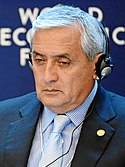2011 Guatemalan general election
| |||||||||||||||||
| |||||||||||||||||
| |||||||||||||||||
| This article is part of a series on |
| Politics of Guatemala |
|---|
 |
|
|
Elections were held on 11 September 2011 in Guatemala for the offices of President and Vice President; as well as members of Congress by national list and districts, members to the Central American Parliament, and the Mayor and council for all the Municipalities. All positions were elected for a four-year period. Retired General Otto Pérez Molina of the Patriotic Party won the presidential election in a runoff against populist Manuel Baldizón of the LIDER party.
Presidential election
The presidential election is being contested by retired General Otto Pérez Molina who lost in the run-off to President Álvaro Colom in 2007. Guatemalan National Revolutionary Unity and other leftist groups have joined together in the Frente Amplio and nominated Rigoberta Menchú for president.[citation needed]
Polls show Pérez Molina with a lead over other possible candidates.[1]
- Candidates
- Otto Pérez Molina
- Manuel Baldizón
- Rigoberta Menchú
- Harold Caballeros
- Eduardo Suger
- Juan Guillermo Gutiérrez
- Mario Estrada
- Patricia de Arzú
- Adela de Torrebiarte
- Alejandro Giammattei
Opinion polls
A poll for the second round showed Pérez Molina with 49.4% to Baldizón's 39.2%; 11% were undecided.[2] A second poll gave Pérez Molina 39.7% to Baldizón's 32.2%, with 28% undecided.[3] A third poll gave Pérez Molina the lead with 45.7% to Baldizón's 37.2% and 17.1% undecided.[4] A final poll had Pérez Molina ahead with 54.6%, Baldizón at 38.7% and undecided at 5.7%.[5]
Congress
On 11 September, the parliamentary election took place. Of 158 congressmen to be elected, 126 congressmen sought re-election but only 56 were re-elected and 102 new congressmen were elected for the first time since democratic election took root in Guatemala. About 65% of MPs were first time representatives, which was the first time this occurred since the 1995 election.[citation needed]
Campaign
Guatemala's high crime rate was a major issue in the campaign as it sits near the Mexican border that is a conduit for drug traffiking.
Baldizon campaigned on the premise of having Guatemala's football team to the World Cup. Additionally he also promised to tackle poverty and crime, as well as assure workers an extra month's salary every year. He also said he would reinstate the death penalty and televise executions.
Observers
Amongst the oberservers for the election were Oscar Almengor, who led a team University of San Carlos.[6]
Controversies
According to Article 186(c) of the Constitution, the relatives of the President cannot participate in the Presidential election when the relative holds the Presidency. Sandra Torres, former wife of the current president, got divorced to run for the presidency. There were several requests to have a warrant to forbid Sandra Torres from participating in the election. On 9 August 2011, the Constitutional Court upheld a sentence of the Supreme Court preventing Torres from running.[citation needed]
Results
Former Foreign Minister Edgar Gutierrez said that "the polling methods are inadequate. They've failed to capture how between 25 and 30 per cent of the people intend to vote."
- Executive
Preliminary vote counting suggested that Molina has the highest count of the votes, having 37% support with more than 80% of the votes counted.[7] Therefore, it is highly likely that none of the presidential candidates will obtain an absolute majority of votes in this election (50% + 1 vote), therefore prompting a run-off election (second round) on 6 November 2011.[8]
On 6 November, Molina declared victory in the election saying that: "For all the Guatemalans who have put their trust in me, I thank you very much. To those Guatemalans who did not vote for Otto Perez, I make a call to unite and to work together in the next four years, leaving aside party colours." Turnout for the runoff was half that of the first round in some regions.[6]
Template:Guatemalan presidential election, 2011
- Legislative
Template:Guatemalan parliamentary election, 2011
Analysis
Molina would be the first former military officer to be democratically elected, which was helped by Guatemala's young population that do not remember the events of the Guatemalan civil war.[6]
References
- ^ http://english.aljazeera.net/news/americas/2011/09/2011911123350301233.html
- ^ http://centralamericanpolitics.blogspot.com/2011/10/2nd-round-poll-numbers.html
- ^ http://centralamericanpolitics.blogspot.com/2011/10/2nd-poll-has-perez-molina-in-lead.html
- ^ http://centralamericanpolitics.blogspot.com/2011/10/three-for-three.html
- ^ http://centralamericanpolitics.blogspot.com/2011/11/weekend-elections.html
- ^ a b c http://english.aljazeera.net/news/americas/2011/11/2011117131144103.html
- ^ http://www.reuters.com/article/2011/09/12/us-guatemala-election-idUSTRE78B0KE20110912
- ^ http://correos.com.gt/web/wp-content/plugins/download-monitor/download.php?id=14


